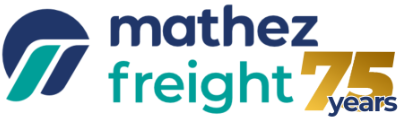An Importer of Record (IOR) or an Exporter of Record (EOR) will help you complying with European legal regulations for import and export, such as taxes, paying duties, fees, customs, and so on…

Quick Tips for Logistics Professionals
- You need an Importer of Record (IOR) if you are a non European company selling under DDP in the European Union. It can be your buyer or a customs representative doing indirect customs representation, depending on your case.
- You need an Exporter of Record (EOR) if you are a non-European company exporting goods from France. However, companies that are not established in France must designate a third party to act as an EOR. It can be a European subsidiary, a customs representative, a tax representative or a logistician.
- Depending on your situation, MATHEZ FREIGHT & COMPLIANCE may help you determine the most appropriate setup. MATHEZ FREIGHT never acts as an IOR/EOR but our sister company EASYTAX may act as fiscal representative and EOR in some cases.
Importer Of Record (IOR) for import operations into France
If you are a non-European company and need to import goods into France, you need to appoint an importer while going through European customs procedures. What are your options as a foreign company selling under a DDP Incoterm in France ?
Scenario 1 – your customer is registered in the European Union and acts as an Importer of Record (IOR)
While using the DDP Incoterm, you can easily import your goods into the European Union by using your customer as your Importer of Record (IOR) if your customer is already registered for VAT in the European Union and has EORI number.
- Your buyer will be designated as your “Importer of Record” on the import customs document,
- Your buyer will have to sign a Power Of Attorney with the Customs Representative.
In this scenario, the VAT will be reverse charged, which means your buyer (the importer) will be responsible for the VAT declaration. This is a simple operation for the buyer, which Fdoes not involve the disbursement of VAT.
This is called a “DDP excluding VAT”.
Scenario 2 – you can’t use your European customer as your Importer of Record (IOR)
If you are a non-European company, your business setup might not allow you to designate an Importer of Record (IOR). This situation might happen in several cases, such as:
- Stock transfer or consignment stock;
- Participation in a European trade exhibition or congress;
- Marketplace sales;
- Your customer/importer is not willing to be your Importer of Record.
In this scenario, you will have to designate representatives to carry out your customs and VAT obligations within the European Union.
Designation of a customs representative to import into France
Non-European companies that can not designate their customer as an Importer of Record must appoint a customs representative acting under indirect representation to perform their import customs declaration in France. This customs declaration is called DAU “Document Administratif Unique”, or Single Administrative Document”.
Customs representatives are capable of dealing with complex operations involving fiscal representation, IOR, and indirect representation.
Non-European companies who cannot designate their customer as an Importer of Record must appoint a customs representative for their imports into the EU. The customs agent will have to accept acting under indirect representation for these imports.
In the context of customs subcontracting, there are two types of customs representation:
- The Direct Representation (mode “2” in DAU box 14): The customs representative acts on behalf of its stakeholder, but the responsibility for the operation remains with the stakeholder. If there are any problems, customs will address the stakeholder. It is therefore a mode of representation reserved for European companies.
- The Indirect Representation (mode “3” in DAU box 14): The customs representative acts in their own name and on behalf of the stakeholder. The indirect representation is mandatory for customs clearance for non-European companies. In the case of wrongly declared or unpaid import VAT or customs duties, customs are most likely to pursue the customs representative and not the non-European party. The customs agent should ensure that they have contractual arrangements in place to protect them from any non-compliance by their customer. As it is a risky operation for customs representatives, only a few accept to operate indirect representation.
Designation of a fiscal representative
In the above scenarios and many more, non-European companies must designate a fiscal representative to comply with VAT regulations while doing business in the EU. For more information, check out the basics of Intra-community VAT with our sister company EASYTAX.
Exporter Of Record (EOR) for export operations in France
Following a recent French customs regulation*, a non-European company that is not permanently established in France can no longer be an Exporter of Records on an export customs document. As a result, a non-European company can no longer be named in box 2 of the export customs declaration in France. This rule applies even if the non-European company has an EORI number or is registered for VAT in France.
There are several reasons why this may happen, including:
- A non-European company has stock in France and needs to export it to a third country.
- Returns of goods from France to the original non-European seller (for non-conformity, or after-sales service)…
* Delegated Regulation (EU) 2018/1063 of 16 May 2018 amending Article 1 § 19 of Delegated Regulation 2015/2446 of 28 July 2015.
A non-European company must assign a third party, established in the European Union’s customs territory, to act as an exporter of records. This third party must be involved in the export process and will act on behalf of the non-European company for customs purposes only (box 2 of the DAU).
Non-European companies can no longer export from France without a third-party Exporter of Record
Who can be designated as an Exporter of Record for your customs operations?
- A fiscal representative – for example, our sister company easytax.co
- A European subsidiary;
- A logistician;
- A customs representative – however, please note that MATHEZ FREIGHT currently does not provide this service.
Don’t confuse an IOR or EOR with an EAR, RCR, or Tax Rep:
- European Authorized Representative (EAR): an EAR is a legal entity designated by non-European Union (EU) manufacturers to represent them in the European Union and to ensure their compliance with the European directives (related to medical devices, for instance).
- Registered Customs Representative (RCR): an RCR handles your customs declarations on your behalf in the European Union.
- A Tax Representative carries out your VAT obligations and declarations on your behalf in the European Union.
European customs regulations change regularly. Make sure you’re with a solid partner.


